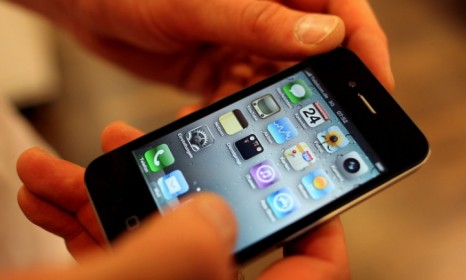Has your smartphone been hacked?
Hackers are shifting their focus to the mobile computer in your pocket. Are you at risk?

A free daily email with the biggest news stories of the day – and the best features from TheWeek.com
You are now subscribed
Your newsletter sign-up was successful
With smartphone sales poised to hit 421 million this year, "the long-predicted crime wave on hand-held devices appears to have arrived," says Riva Richmond in The New York Times. Until recently, hackers focused most of their energy on Windows XP, the aged Microsoft operating system that has proven vulnerable to attack. But according to Lookout, a computer security firm, the amount of malware on smartphones has more than doubled since December 2009. And with smartphone sales set to surpass PC sales for the first time this year, the trend is not expected to slow anytime soon. Here, a brief guide to the security danger in your pocket:
How do hackers strike?
There are more than 500 varieties of doctored applications that dupe smartphone users. Many attacks use a survey or some other bait that, when clicked on, reveals important personal information. Fake online surveys on Facebook, for example, tell users to list a cellphone number, which is then billed at the end of the month. At the moment, almost all such ruses depend on the user actively agreeing to download or sign up for a service, though experts think that automatic attacks, which could strike even if users are vigilant, are on the horizon.
The Week
Escape your echo chamber. Get the facts behind the news, plus analysis from multiple perspectives.

Sign up for The Week's Free Newsletters
From our morning news briefing to a weekly Good News Newsletter, get the best of The Week delivered directly to your inbox.
From our morning news briefing to a weekly Good News Newsletter, get the best of The Week delivered directly to your inbox.
Which phones are most vulnerable?
iPhones have remained almost invulnerable — the only notable malware episode, which occurred in 2009, involved software that had not been authorized by Apple. BlackBerrys, meanwhile, are "typically provided and controlled by security-conscious employers," making them a less common target. Android is a different story. Because developers don't need approval to make it into the app store, fake programs have an easier time going unnoticed.
So am I at risk?
Right now, European and Asian users are hackers' prime targets. Nokia's Symbian operating system, which is the most popular worldwide, is especially vulnerable to attack, accounting for 88% of all security breaches. But while "smartphones aren't a major malware target in the United States yet," there are plenty of reasons to be concerned, says Nick Mediati at PCWorld.
A free daily email with the biggest news stories of the day – and the best features from TheWeek.com
Is this really such a big problem?
The whole issue is overblown, says Bill Snyder at MacWorld. Despite the hype, which tech journalists have helped create, mobile attacks remain very rare. And even though they're likely to become more common, "they’ll be very different from the desktop hacks we've all seen." In part, that's because mobile phones are not dominated by one operating system, the way computers have been all but monopolized by Windows for many years.
How do I protect myself?
"Users should install apps only from sites they trust," says the Times, and do a little research to make sure that what they're downloading isn't malware. For the "extra cautious," there are also a range of security programs — some free, some that will cost you — for every platform except the iPhone. Checking your phone bill at the end of every month is also advisable, as hackers often attempt to tack on extra charges. Just be vigilant!
Sources: New York Times, PCWorld, The Register, MacWorld
-
 Antonia Romeo and Whitehall’s women problem
Antonia Romeo and Whitehall’s women problemThe Explainer Before her appointment as cabinet secretary, commentators said hostile briefings and vetting concerns were evidence of ‘sexist, misogynistic culture’ in No. 10
-
 Local elections 2026: where are they and who is expected to win?
Local elections 2026: where are they and who is expected to win?The Explainer Labour is braced for heavy losses and U-turn on postponing some council elections hasn’t helped the party’s prospects
-
 6 of the world’s most accessible destinations
6 of the world’s most accessible destinationsThe Week Recommends Experience all of Berlin, Singapore and Sydney